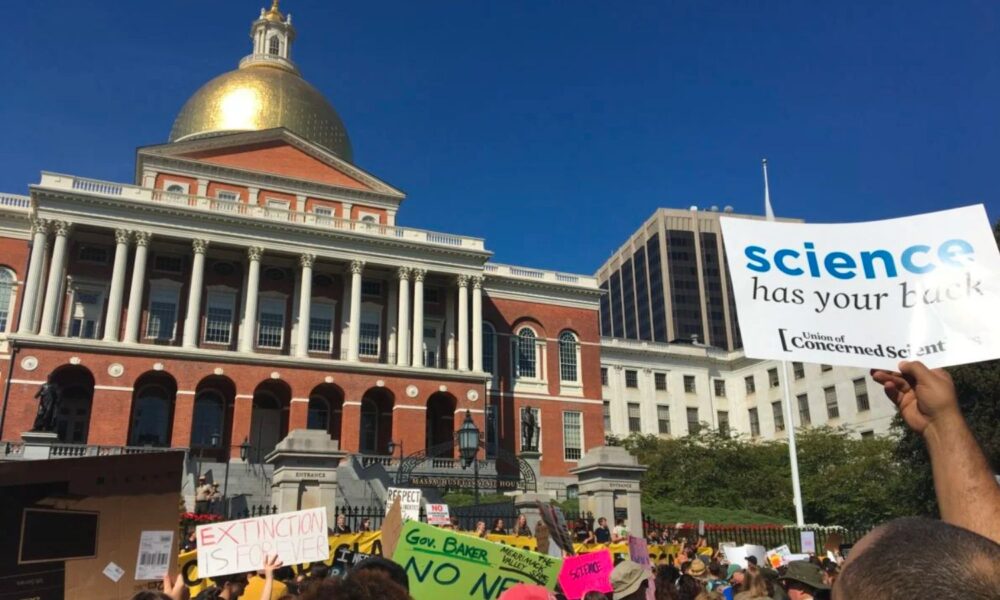The US Supreme Court’s recent decision dramatically limiting EPA’s ability to curb carbon emissions is bad news for our fight against climate change. The setbacks in the latest negotiations among congressional Democrats (with no Republicans willing to talk climate) cast doubt on the viability of a legislative pathway at the federal level anytime soon.
One state legislature is poised to send a strong signal that it’s not taking any of that lying down.
In Massachusetts, this near-term opportunity would drive progress on clean energy, clean transportation, and equity. With a legislative session that’s about to wrap up, getting the bill into law will require diplomacy and ambition.
Here’s where things stand, what’s at stake, and where things go next.
Where things stand
Both the Massachusetts House of Representatives and the Senate have passed good, solid clean energy bills. In March, the House passed the “Act Advancing Offshore Wind and Clean Energy.” The Senate responded in April with a broader climate and energy bill, the “Act Driving Climate Policy Forward.”
In May those competing—or complementary, actually—visions were routed to a conference committee, where a set of six legislators, three members of each chamber, is tasked with reconciling the two bills and coming up with a unified one that both chambers could support. The conferees are working to do just that.
What’s at stake
What’s on the table includes provisions to:
- Drive robust air quality monitoring so that targeted interventions can have the greatest impact, and we can more easily track progress in air quality improvements for residents most burdened by the harmful localized air pollution. It’s not the full provisions of the air quality bill that we and our allies have pushed this session, but it would be an important next step in improving equity around transportation and power generation in the commonwealth.
- Accelerate electric vehicle (EV) adoption. One provision would nail down 2035 as the date when all new car sales in the state have to be electric, and another would set a date for converting to all-electric the bus fleet of the Massachusetts Bay Transportation Authority, which serves the greater Boston area, which would be huge for reducing tailpipe pollution in urban areas. Another provision would codify point-of-sale rebates for EVs, so that prospective buyers would pay only the portion of the purchase price that a rebate wouldn’t cover, rather than having to wait to get reimbursed for that portion.
- Accelerate responsible clean energy. There’s great language in the House bill to strengthen labor and environmental provisions, and the Senate bill would let the administration increase the state’s offshore wind target from the current 5,600 to 10,000 megawatts, which would make Massachusetts even more of a leader for driving offshore wind market development. (For context, New York and New Jersey are currently targeting 9,000 and 7,500 megawatts, respectively.) Other provisions would do more to encourage energy storage, strengthen the prospects for rooftop solar, and let communities engage directly in supporting large-scale renewable energy development.
That’s just a sampling. There’s even more good stuff in each chamber’s bill that deserves to make it into the final package.
What’s next
For that final package, what we’re looking for from the conference committee is ambition. Ambition in clean energy, so that whatever emerges demonstrably moves the ball forward on our transition to clean electricity and clean transportation, accelerates our move off of fossil fuels. Ambition in equity, with a bill that underscores the commonwealth’s commitment to addressing—and doing away with—the long-standing inequities regarding who is most harmed by power plant and vehicle pollution. Ambition in excellence, with strong attention to making the transition as right as possible, with regard to workers, public health, and the environment.
While I don’t doubt the Legislature’s commitment to coming back next session with decisive actions, we need to decarbonize our economy, and we need to send clear signals, now. So, in this bill, this session, we need as much we can get, and a clear rejection of obstructionism and wrongheadedness in Washington, D.C.
What we’re also looking to the conference committee for is a successful negotiation. Getting those and other good pieces into law is dependent on coming up with a strong bill soon. Massachusetts’s two-year legislative session ends July 31, so the committee needs to present its compromise bill in the next few days to give each chamber time to approve the new version and to leave time for any negotiations with the governor (potentially via a veto, then an override).
State ambition, state action, and state leadership clearly aren’t a substitute for responsible governance from Washington. But there’s so much leadership that can and must come from states, including their legislatures. And at a time when those forces of obstructionism are rampant, Massachusetts is poised to weigh in on the side of climate action, and to add to the momentum in favor of sanity.
Massachusetts needs a climate and energy bill, and it needs a good one. It doesn’t have to be perfect. It does have to be a fitting response to this moment.

